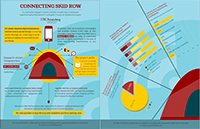Connecting Skid Row Project
People experiencing homelessness are often socially marginalized and denied access to technology resources. Yet they find ways to use communication technologies such as smartphones and the Internet throughout their daily lives, to seek information, build or maintain social ties, or for entertainment. How do these practices help them acquire resources, access services or activate systems of social support?
The Connecting Skid Row Project explores these questions through community-engaged research with surveys, in-depth interviews, and co-design with local community partners. The project pursues several related goals. The first is to examine the abilities and motivations of houseless people in Los Angeles County to go online. This includes an examination of the key barriers they face, the various strategies they deploy to overcome these barriers, and the differences in online engagement patterns within this population. We study the role internet access plays in creating networks of support and facilitating access to resources that increase opportunities for transitioning out of homelessness. For this purpose, we have deployed a non-probabilistic survey among LA County residents who are experiencing homeless or at risk of becoming homeless, in collaboration with the Los Angeles Public Library.
Second, we have partnered with the Los Angeles Community Action Network (LA CAN) to co-design, build, deploy and test facilities that empower Skid Row residents with online options. Together, we are conducting participatory design workshops with Skid Row residents, to create off-the-grid phone charging stations and offer free WiFi access.
The project’s third goal is to map communication technology infrastructure available on Skid Row. For this purpose, we are utilizing a number of techniques, including spatial ethnography, inventory of payphones and publicly accessible charging outlets, as well as “wardriving” Skid Row and adjacent areas to map public Wi-Fi access points.
The project has received financial support from the USC Office of Research (Zumberge Diversity and Inclusion grant) and the USC Price Center for Social Innovation. Current team members include Prof. Hernan Galperin, Prof. François Bar, Prof. Annette Kim (USC Price), Prof. Ellen Helsper (LSE) and doctoral students Matthew Bui, Olivia Gonzalez, Sierra Bray, Sarah Nguyen, Cerianne Robertson, Paulina Lanz, Hyun Tae (Calvin) Kim (Annenberg School), and Kurt Daum and Thai Le (USC Price School).
Read more about the project:
Galperin, H., Bar, F., & Nguyen, H. (2020). The power divide: Mobile communication in Los Angeles’ Skid Row. Mobile Media & Communication, 9(1), 30–50. https://doi.org/10.1177/2050157920932608
DiGuiseppi, G., Corcoran, C., Cunningham, T., Nguyen, H., Noel, M., White, P., & Bar, F. (2020). Mobilizing a Community–Academic Partnership to Provide DIY Handwashing Stations to Skid Row Residents During COVID-19. Health Promotion Practice, 22(1), 9–12. https://doi.org/10.1177/
Robertson, C., Bar, F., & DiGuiseppi, G. (n.d.). How can the houseless fight the coronavirus? A community organization partners with academics to create a grassroots hand-washing infrastructure. The Conversation. http://theconversation.com/
